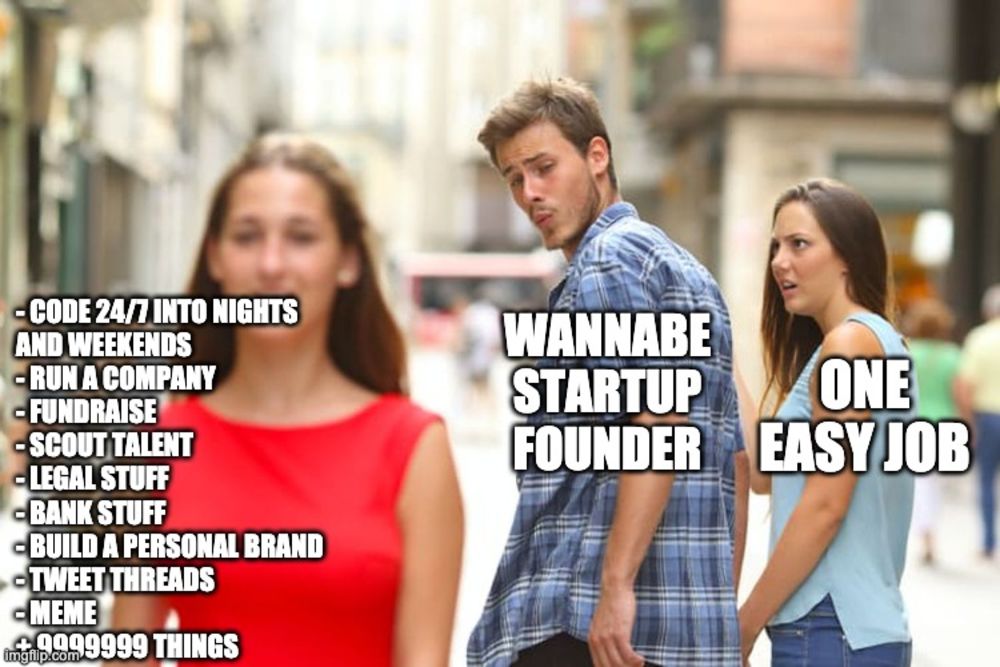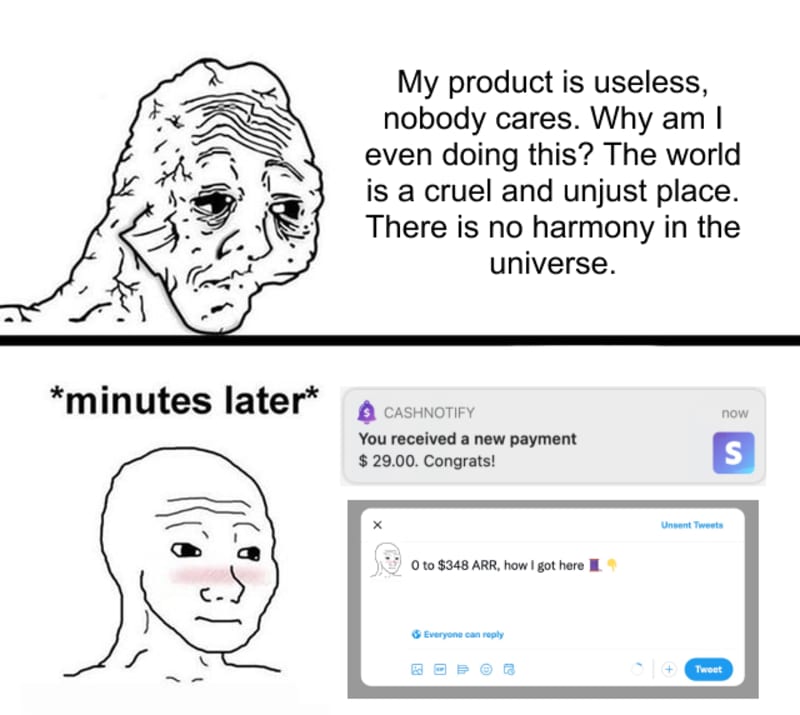
Some unpopular thoughts on startup jokes and memes
Twitter is full of startup "wisdom". Some are in the form of memes, others are definitive statements. Some are funny, some are not.

One of my memes that went viral
This is all perfectly fine because people can relate. Relatable content lightens the mood and makes you feel as though you belong. You are not alone in making the mistakes you made.
There is comfort in this.
But, I also find a lot of this content very harmful. I think the people who share these memes and jokes are not fully considering the things they are saying, causing great harm in the process. Let's dive into a few examples.
Generic memes about marketing
You've probably seen these - it's a joke (or supposed to be a joke) about startup founders who create something and expect the customers to show up, but nobody shows up.
I've actually created this meme myself and it went viral in the Startup topic. Now, I am not sure I should have. In fact, as I write this I feel guilt.
The problem with generic marketing memes that mock the founder for not "marketing" their product, is that they are not useful, and only aim to mock and put down the person who is genuinely trying their hardest.
The term "marketing" itself is loaded with meaning. What does marketing mean? It means different things to different people. Mocking people for not marketing is like mocking them for not doing "that thing" that would make you successful.
What thing?
What should a founder be doing to "market" their product?
No one will tell you.
Actually, some people will. They'll share what they have done and what has worked for them:
- SEO
- Facebook group outreach
- App store optimization (ASO)
- Reddit outreach
- Cold email
- etc...
Whatever the method of promotion or attracting customers, the people sharing these things are doing a service to the startup community. It's not to say that those things will work for the new founder, but at least they have a chance of working.
Marketing memes on the other hand do absolutely nothing positive for the community.
How would you feel if you worked your butt off for 6 months, announced your product to the world in the best way you could, and had exactly 0 customers?
Not great.
Then you go on Twitter and another more successful founder mocks you for not "marketing".
How does that feel?
It feels shitty.
Instead of sharing some successful marketing strategies (with specific details), you take a superiority dump on their self-esteem.
Having been part of this circle-jerk I now feel terrible. I hope founders ignored it and kept on pushing to find their first customers.
The obvious defense that one would present to this is that it wakes people up to start promoting their product.
This too is fine, but it can be done in a much more positive way by talking about your own experience and offering actual strategies that moved the needle for you.
Jokes and memes about the shiny object syndrome
While this is a real thing and many founders fall for the shiny object syndrome, the way it is memed can also do a great deal of harm to a person's self-esteem. It may even kill their dreams for good.
Mental harm aside, there is an obviously overlooked fallacy in this joke. It assumes that your new ideas are no better than previous.
This is not a fact. I have seen founders work on dumb ideas. I have seen founders succeed with dumb ideas. I have seen founders move from dumb idea to another dumb idea to a great idea. Without shifting from one thing to another they may have never discovered the great idea.
The reality is that there are good and dumb ideas. But all of these things are relevant to how hard you work on your startup and how quickly you can pivot. A great idea can be a dumb idea, and a dumb idea can be a unicorn.
We don't have to look far to find truth in my statements. Pieter Levels claimed only 4 out of 70 projects he created ever made money. Yet, he is known for being a successful solo founder with multiple (4) projects.
Damon Chen built 4 apps and only the 5th one saw traction - which became his full time business (Testimonial.to)
Other founders have similar stories. So when we joke about shiny objects, take these with a grain of salt. There are obvious benefits of building fast and trying multiple things until you see traction and run with that project.
Jokes and memes about adding features and ignoring marketing
This one is probably the most upsetting one to me because it flies in the face of some serious pitfalls of indie startups.
The worst offenders are people who think they can get away with a handful of features, while increasing prices at the same time.
Look, I get that there is truth in this joke/meme, and that increasing prices is not a bad thing when you want to find the ideal customer. But, we should also consider that perhaps there are some obvious benefits in adding features while not paying too much attention to marketing.
They say startups are just a process of bundling and unbundling. Many features to few, few to many. It only stands to reason that there is a market for bundled products.
Products like Systeme.io and Plutio.com are prime examples of great indie products that are many different products bundled into one suite.
But we don't even need to go that far to see the benefits of good features. For many people, given similar pricing, a product may not even be considered unless it reaches feature parity with an existing player. I've run into this many times myself where an indie alternative pops up that seems worth exploring, only to realize it kind of lacks features. I've lost count of how many times I quit indie products because a cheaper, more established player existed in the market that did a better job.
While there is some truth in these memes, the reality is that each product situation is different. Some industries may require a minimum set of features for your product to be considered seriously. Others may require feature parity. Yet others may be more forgiving and let you get away with a handful of features that do one thing well.
Closing thoughts
While it's fun to generate engagement with jokes and memes, it helps to be thoughtful and considerate about how people may interpret them. In times of hopelessness, a silly joke may be the end of an aspiring founder's dream.
I've made the mistake of participating, and regret it. Going forward, I'll strive to do better and to only share things that uplift. For those who keep on making these memes, good luck. I can't say I'll continue following them or won't mute. I just hope we can do better as a startup community and start considering the various nuances in our hasty jokes.